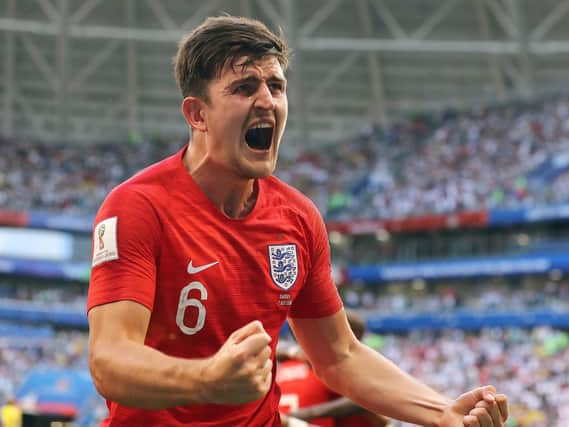UEFA Nations League: Everything you need to know as England's World Cup comes to an end in Russia


Fan parks, bars and pubs in Sheffield and across the country have been packed out as supporters cheered Gareth Southgate's men on at home.
And, thanks to changes from UEFA, fans won't have to wait too long to see England in action in a competitive game again.
Advertisement
Hide AdAdvertisement
Hide AdThe Three Lions will compete in the inaugural UEFA Nations League - but how does it work and when does it all get underway?
Here's everything you need to know.
- The draw for the newly-formed competition took place at the SwissTech Convention Centre in Lausanne, Switzerland on Wednesday, January 24.
Teams were split into four leagues based on their UEFA ranking at the end of the 2018 World Cup qualifiers.
And Gareth Southgate' side were paired with Spain and Croatia - who ended their dreams in Russia with a 2-1 extra-time victory.
They will play in Group 4 of League A.
The other draws were as follows:
League A
Pot 1: Netherlands, France, Germany
Pot 2: Iceland, Switzerland, Belgium
Pot 3: Poland, Italy, Portugal
Pot 4: Croatia, England, Spain
League B
Pot 1: Czech Republic, Ukraine, Slovakia
Pot 2: Turkey, Sweden, Russia
Pot 3: Northern Ireland, Bosnia & Herzegovina, Austria
Pot 4: Denmark, Republic of Ireland, Wales
League C
Pot 1: Israel, Albania, Scotland
Pot 2: Estonia, Finland, Greece, Hungary
Pot 3: Cyprus, Bulgaria, Norway, Slovenia
Pot 4: Lithuania, Montenegro, Serbia, Romania
League D
Group 1: Andorra, Kazakhstan, Latvia, Georgia
Group 2: San Marino, Moldova, Luxembourg, Belarus
Group 3: Kosovo, Malta, Faroe Islands, Azerbaijan
Group 4: Gibraltar, Liechtenstein, Armenia, Macedonia
How do the leagues work?
Advertisement
Hide AdAdvertisement
Hide AdTeams play every other opponent twice (home and away), and the nation that finishes at the top of each table will gain promotion into the league above them while those who finish at the bottom will drop into the league below them.
For example, if Russia - who are in League B - finish at the top of the table after their four fixtures, they will be promoted into League A. But if they finish bottom, they will be relegated to League C. If they come second, they will remain in the same league. They will play at the new level in the next competition which gets underway in 2020.
Given that England only have two opponents, they will only play on four of the allocated six matchdays.
On the other two allocated game days, they will play friendlies.
Advertisement
Hide AdAdvertisement
Hide AdThe top four-ranked League B teams that do not qualify for UEFA EURO 2020 will enter play-offs in March 2020, with one finals place on offer.
In total, four sides will qualify for Euro 2020 via the Nations League.
Each league in the competition gets four play-off spots, but if the winner of a group has already qualified for the Euro 2020, the next best team which has not qualified goes into the play-offs.
Those 16 teams go into four different groups, and the top team overall will go to Euro 2020. The four teams play two one-off semi-finals and a one-off final to determine the play-off winners.
Advertisement
Hide AdAdvertisement
Hide AdThe overall winner of League A will be crowned as UEFA Nations League champions.
What have UEFA said about the Nations League and why has it been introduced?
A statement on UEFA's official website said: "National associations and coaches, in consultations with UEFA, revealed that they feel that friendly internationals are not providing adequate sporting competition.
"The UEFA Nations League creates more meaningful and competitive matches for teams and a dedicated calendar and structure for national team football.
Advertisement
Hide AdAdvertisement
Hide Ad"Top teams can also aspire to take part in the UEFA Nations League finals, a new top-level event. For middle-ranking and smaller nations, the UEFA Nations League will offer an extra way to qualify for UEFA EURO final tournaments. Lower-tier countries – the bottom 16 in the rankings – are now guaranteed one of the 24 qualifying slots for UEFA EURO.
"Lower-ranking teams who have struggled against sides ranked considerably higher than them will now get the chance to take part in balanced matches. Teams do not learn and progress by repeatedly losing; now some sides will start winning.
"While the UEFA Nations League will replace most friendly internationals, there will still be space in the calendar for friendlies, especially for top teams who may want to face opposition from outside Europe as they will be in groups of three teams.
"Associations and teams benefit from clarity of the fixture calendar, and there is now a clear buffer between the end of the UEFA EURO and FIFA World Cup, and vice versa, as well as stability of income."
When will England's games take place?
Advertisement
Hide AdAdvertisement
Hide AdEngland v Spain – Saturday 8 September 2018 (7.45pm kick-off)Croatia v England - Friday 12 October 2018 (7.45pm kick-off)Spain v England – Monday 15 October 2018 (7.45pm kick-off)England v Croatia – Sunday 18 November (2pm kick-off)
When are the play-off and Finals draws?
UEFA EURO 2020 play-off draw: 22 November 2019 UEFA EURO 2020 play-offs: 26–31 March 2020
Finals draw: early December 2018 Finals: 5–9 June 2019